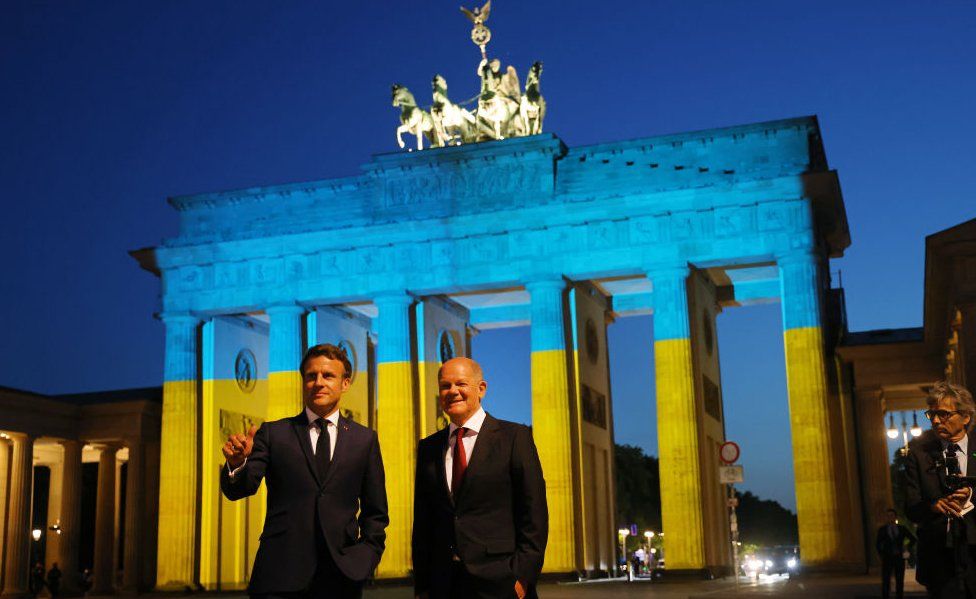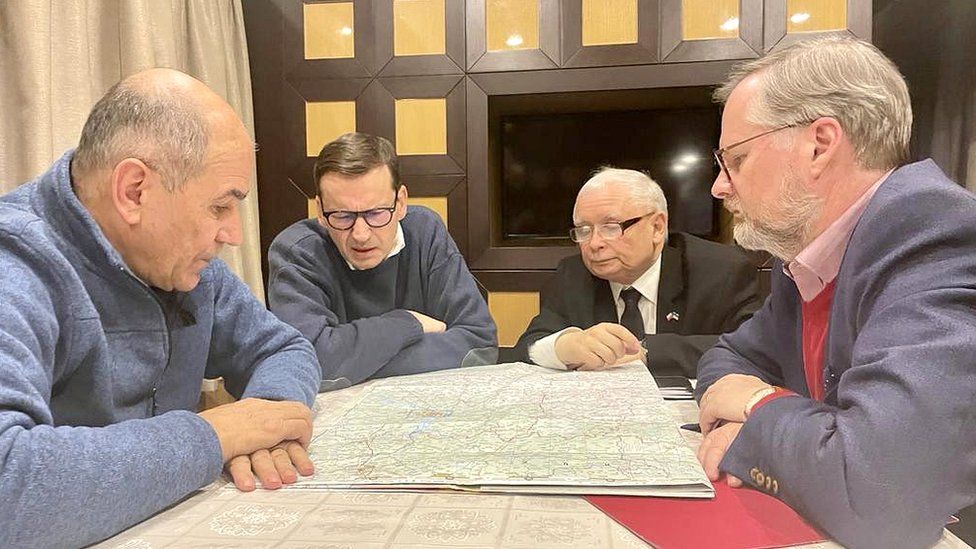BBC News 10 May 2022 - by Katya Adler
Freshly re-elected Emmanuel Macron chose 9 May to come to dinner in Berlin. An auspicious date in EU circles.
Nicknamed "Europe Day", it commemorates the signing of the post World War Two Schuman declaration promoting peace between European nations.
Together, he said, France and Germany carried the ambition for a stronger, more sovereign, more democratic, more united EU, able to rise to the challenges currently facing the continent.
It's EU tradition for French and German leaders to visit each other as the first trip abroad following their election. An intentionally symbolic display of the bloc's Franco-German motor purring, even roaring ahead.
At least, they hope that's the message transmitted.
But how united and influential are France and Germany in today's EU?
I'd argue the Russia-Ukraine crisis has fundamentally shifted not only EU security dynamics, but the balance of power in the bloc too. And it's no longer just about France and Germany.
When Mr Macron first came to Berlin back in 2017, he was a rookie compared to then Chancellor Angela Merkel.
But her successor Olaf Scholz has handled Russia sanctions and weapons deliveries to Ukraine slowly and clumsily during the current crisis - frustrating voters at home and allies abroad.
I asked Mr Scholz at his press conference with Mr Macron whether he was concerned about Germany's reputation and leadership role in Europe as a result.
He robustly defended Germany's record. Berlin in the end moved dramatically to reverse its reliance on Russian energy (moving from a 35% to a 12% reliance on Russian oil within a few weeks).
It put historical angst and innate risk-aversion aside, (belatedly) delivering heavy weapons to Ukraine. And Mr Scholz turned German defence priorities on their head early on in the crisis, promising to invest €100bn ($100bn; £85bn) in modernising the armed forces and increasing defence spending to the 2% of GDP requested by Nato.
But by huffing and puffing and dragging its heels before taking action, the impression Germany has given is of a reluctant or backseat member of the Western alliance when it comes to countering the Kremlin.
"We should send signals of strength not weakness to the Kremlin. This just encourages the Russian president to do what he is doing," according to Peter Beyer, a Christian Democratic Union MP and member of the German Parliament's defence committee.
"I don't want to be critical just because my party is now in opposition," he insisted to me But, he said, Olaf Scholz seems always to have to be pushed into action by others, by public opinion or by criticism from European partners.
"And why should that be? We're Germany. We shouldn't just lead economically but also politically but [Mr Scholz] isn't in the driving seat."
Indeed in the diplomatic, defence, economic and energy crisis Europe currently finds itself in - where as one EU leader after another notes Russia has brought war and the threat of nuclear attack back to the continent - mighty power Germany has conspicuously failed to take the lead.
And so Mr Macron believes this to be his moment. Time for Germany to play sous-chef, he thinks, while he drives the EU initiative.
Angela Merkel rather squashed his reformist zeal, but Macron's ideas of promoting EU sovereignty in new technologies, defence, energy and food production have now been gaining traction. A result of Russia's belligerence in Ukraine and the strain on global supply chains caused by the Covid pandemic.
France currently holds the EU's rotating presidency. Before coming to Berlin on Monday, Mr Macron addressed the European Parliament on his vision for the bloc's future.
This included the not entirely new idea of establishing an outer EU circle of like-minded nations including "those who have left the EU" (a clear nod to the UK) and others waiting to join, like Ukraine and countries in the western Balkans.
And while there's smouldering resentment that Germany has been too soft for too long on Moscow - driven largely, it's believed, by economic interests - many of the same critics are also impatient with Mr Macron for repeatedly pursuing diplomatic openings with Vladimir Putin.
Poland and the Baltic nations along with other hawkish former communist countries like the Czech Republic have pushed to take the lead in Nato and EU defence decisions during the Russia-Ukraine crisis.
Hungary has risen to prominence too. As a not entirely unexpected spanner in the works of EU sanctions.
Prime Minister Victor Orban, known for his good relations with Mr Putin, is holding the EU hostage over plans for oil sanctions. Refusing to sign on the dotted line until his Russian-energy dependent country gets a favourable deal.
Projecting a united and determined Western front against Mr Putin is of paramount importance to the EU and Nato right now. But neither Paris nor Berlin have been able to reign in Mr Orban. The European Commission President flew to Budapest on Monday night to try - to no avail.
Of course keeping 27 countries united on sanctions when each one is impacted in a different way is a huge challenge and this is interpreted by Mr Putin as a weakness.
Think back to the eurozone and, specifically, the Greek debt crisis. Angela Merkel would bash EU heads together, or at least keep them in the same room until a solution was found.
She wasn't loved for that but she was respected.
Now Brussels is beginning to ask whether the EU rule that foreign policy decisions, including sanctions packages, must be unanimous is now outdated in these unpredictable and dangerous times.


